Unit 7 The unknown world 讲义(含答案)2024-2025学年沪教牛津版八年级英语下册
文档属性
| 名称 | Unit 7 The unknown world 讲义(含答案)2024-2025学年沪教牛津版八年级英语下册 |
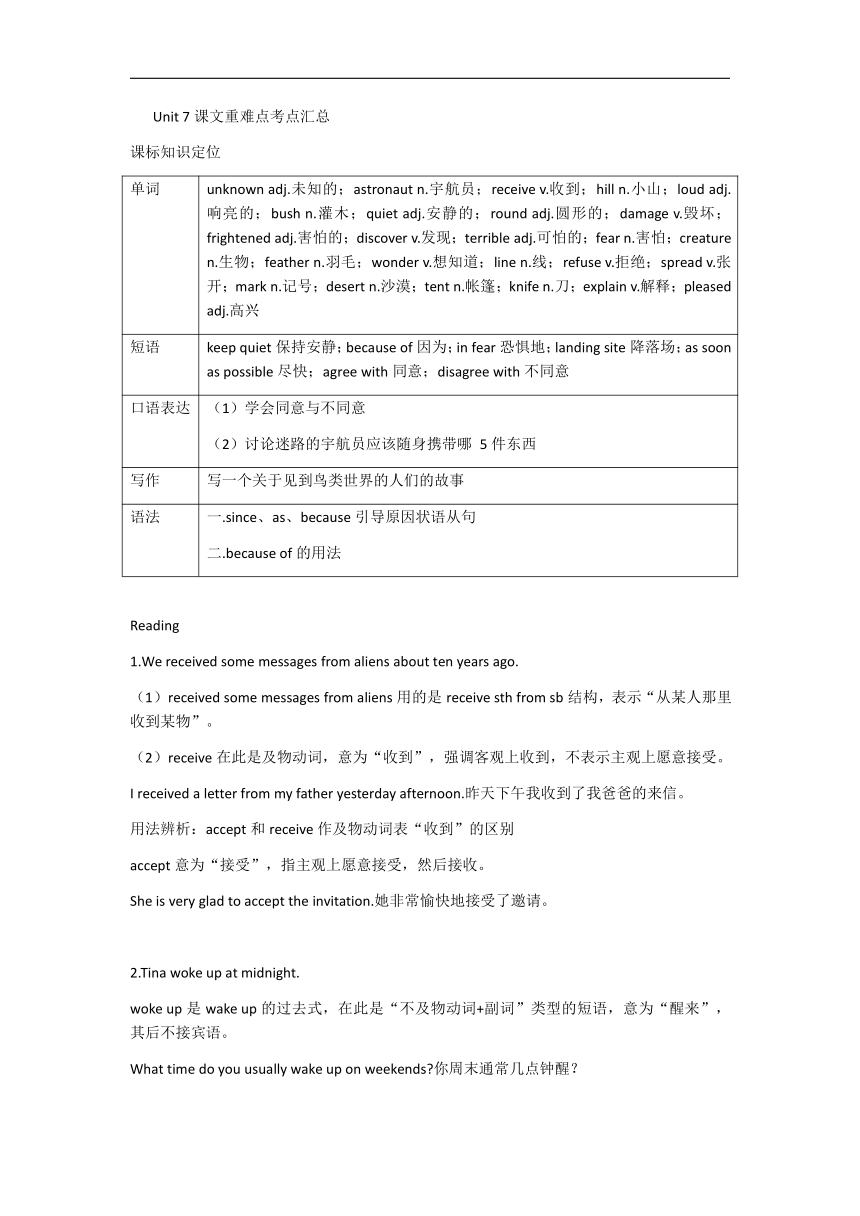
|
|
| 格式 | docx | ||
| 文件大小 | 43.8KB | ||
| 资源类型 | 教案 | ||
| 版本资源 | 牛津深圳版 | ||
| 科目 | 英语 | ||
| 更新时间 | 2025-02-01 22:41:04 | ||
图片预览

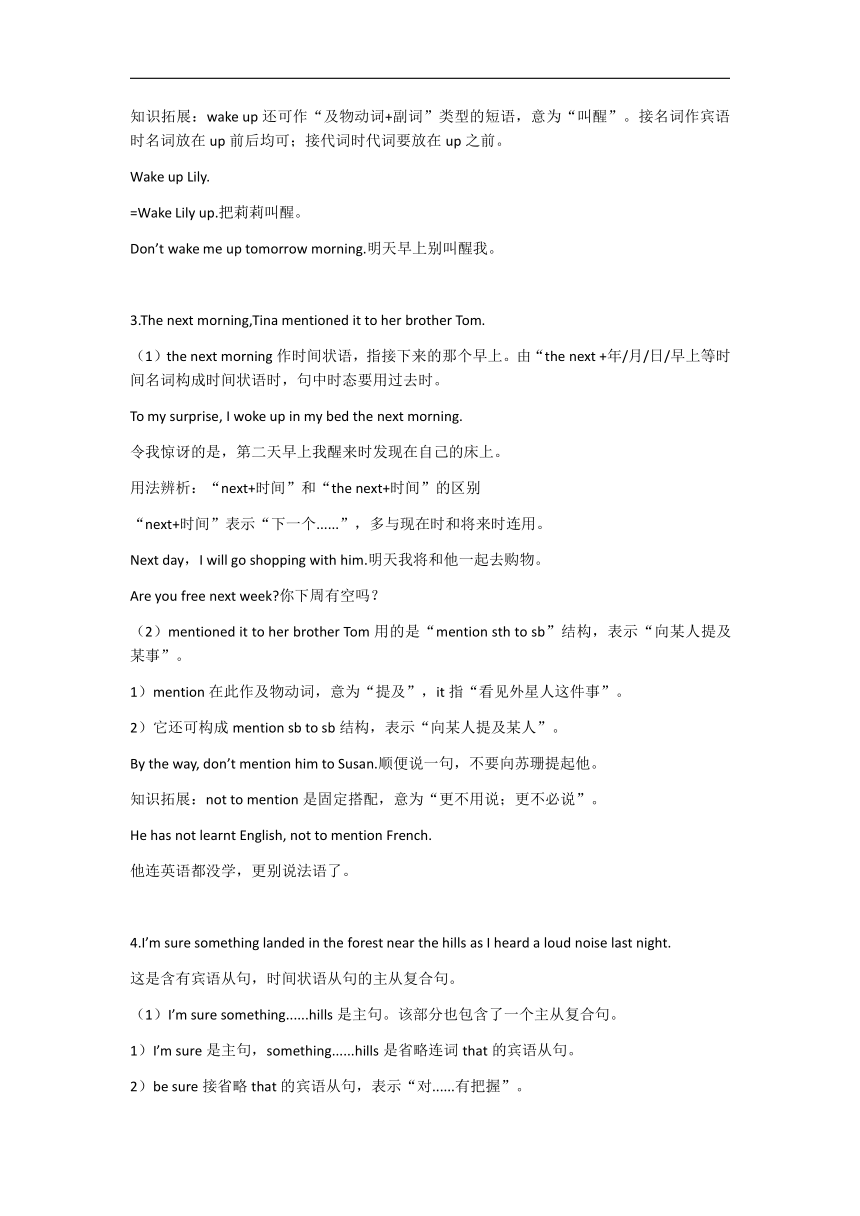
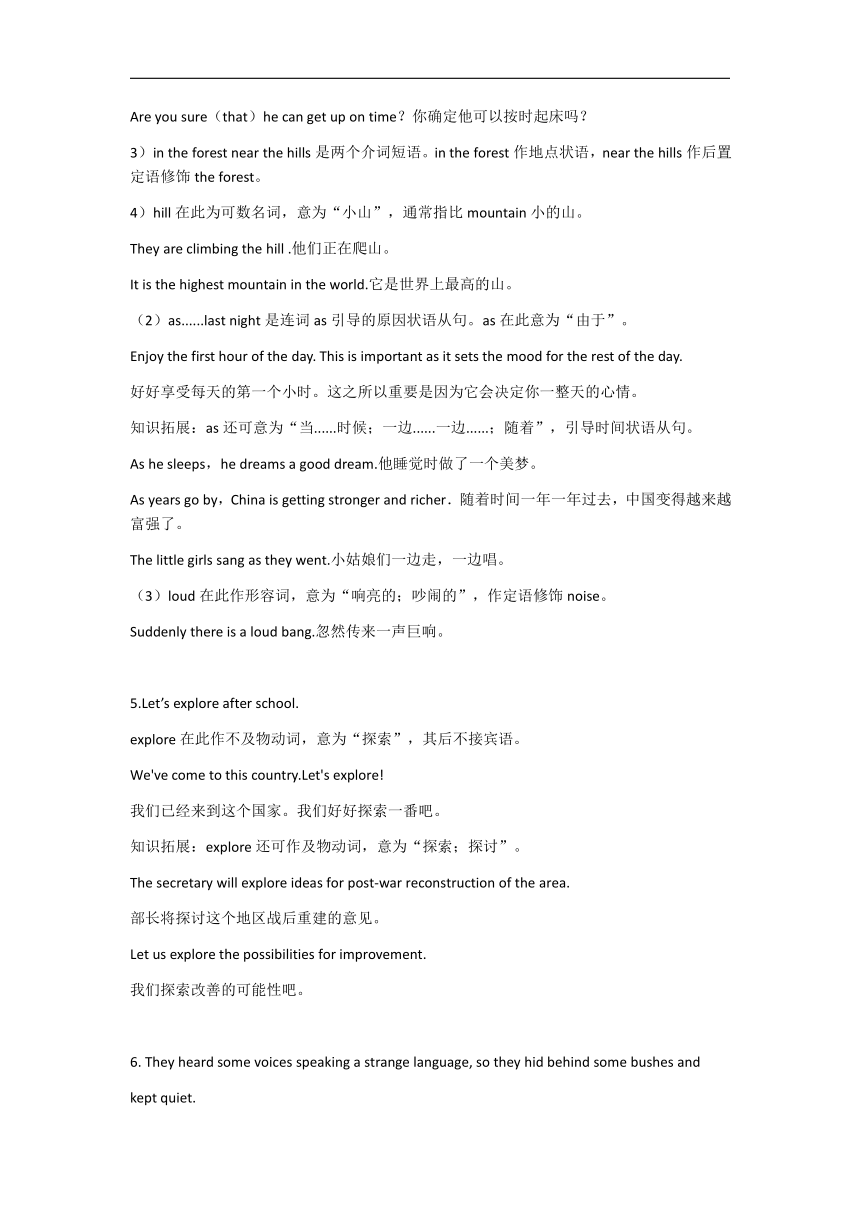
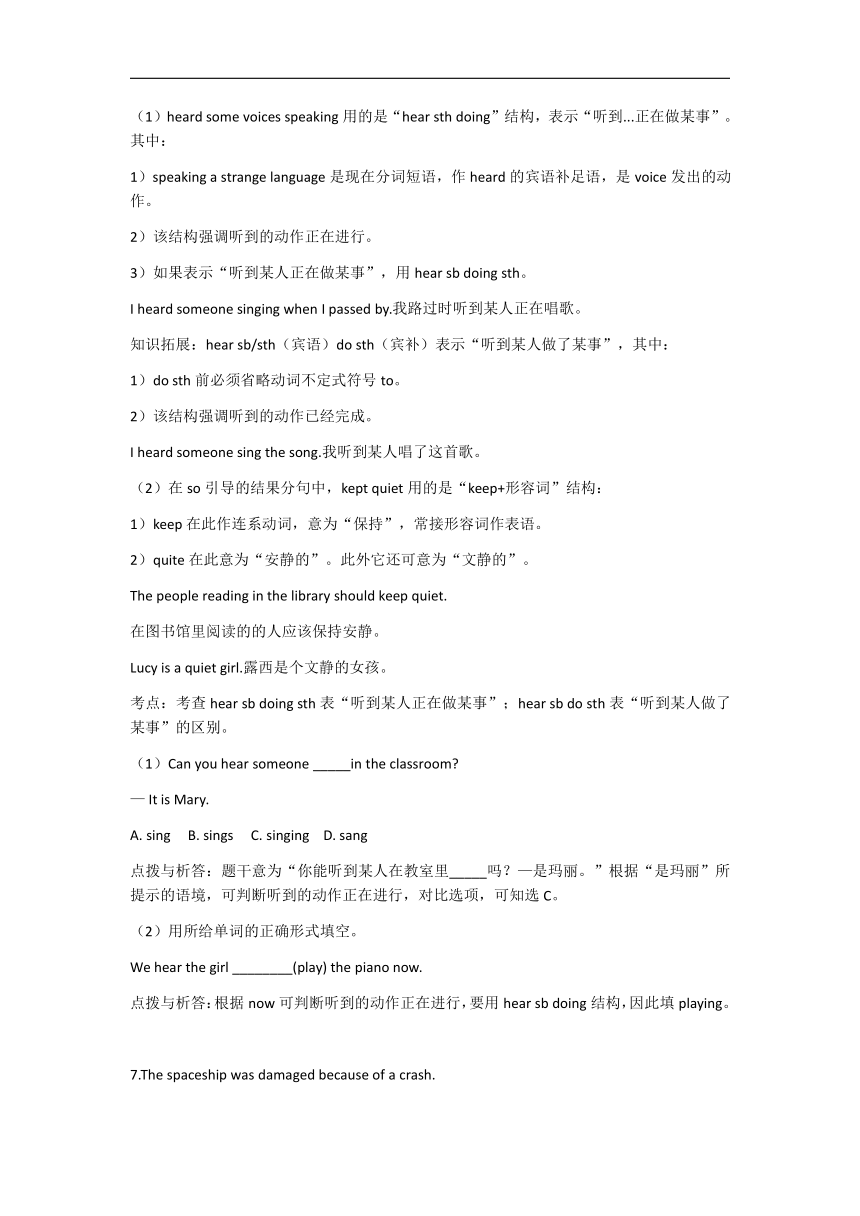
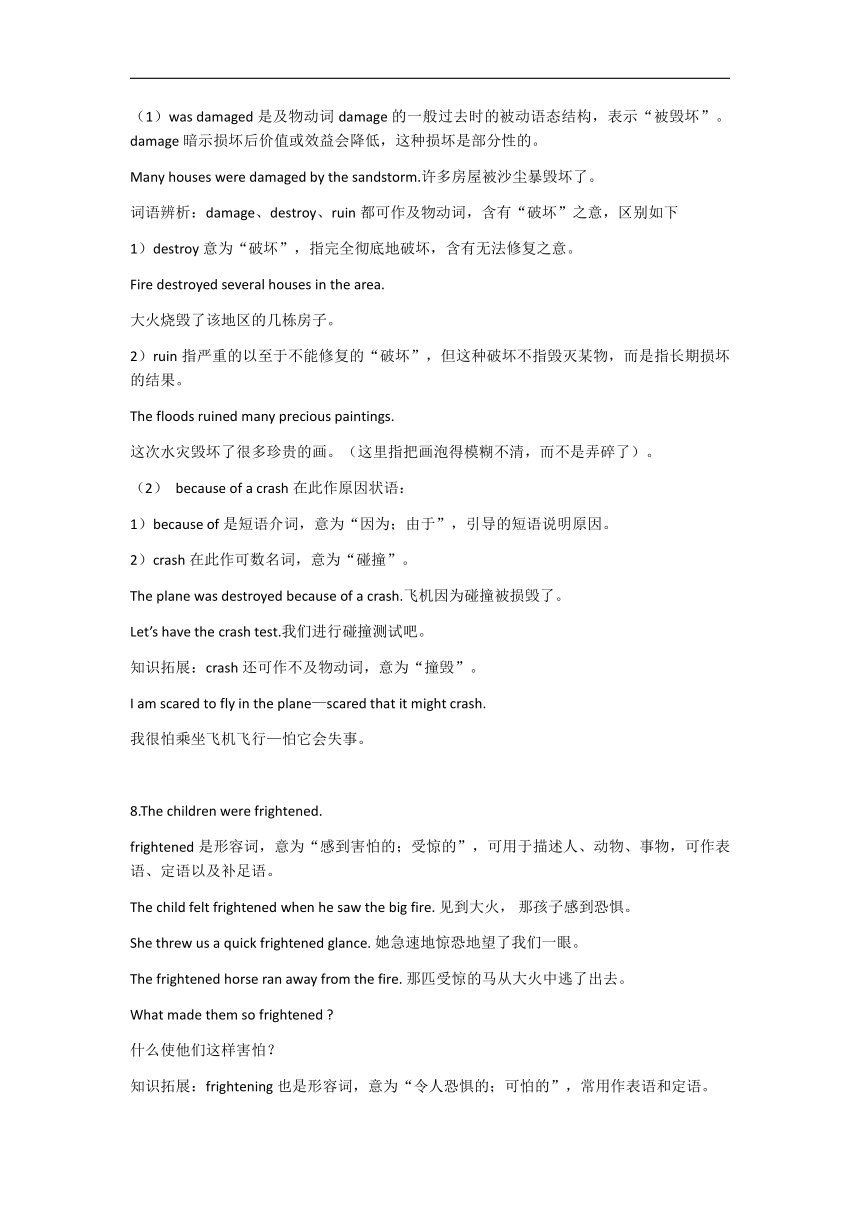
文档简介
Unit 7课文重难点考点汇总
课标知识定位
单词 unknown adj.未知的;astronaut n.宇航员;receive v.收到;hill n.小山;loud adj.响亮的;bush n.灌木;quiet adj.安静的;round adj.圆形的;damage v.毁坏;frightened adj.害怕的;discover v.发现;terrible adj.可怕的;fear n.害怕;creature n.生物;feather n.羽毛;wonder v.想知道;line n.线;refuse v.拒绝;spread v.张开;mark n.记号;desert n.沙漠;tent n.帐篷;knife n.刀;explain v.解释;pleased adj.高兴
短语 keep quiet保持安静;because of因为;in fear恐惧地;landing site降落场;as soon as possible尽快;agree with同意;disagree with不同意
口语表达 学会同意与不同意 讨论迷路的宇航员应该随身携带哪 5件东西
写作 写一个关于见到鸟类世界的人们的故事
语法 since、as、because引导原因状语从句 because of的用法
Reading
We received some messages from aliens about ten years ago.
received some messages from aliens用的是receive sth from sb结构,表示“从某人那里收到某物”。
receive在此是及物动词,意为“收到”,强调客观上收到,不表示主观上愿意接受。
I received a letter from my father yesterday afternoon.昨天下午我收到了我爸爸的来信。
用法辨析:accept和receive作及物动词表“收到”的区别
accept意为“接受”,指主观上愿意接受,然后接收。
She is very glad to accept the invitation.她非常愉快地接受了邀请。
2.Tina woke up at midnight.
woke up是wake up的过去式,在此是“不及物动词+副词”类型的短语,意为“醒来”,其后不接宾语。
What time do you usually wake up on weekends 你周末通常几点钟醒?
知识拓展:wake up还可作“及物动词+副词”类型的短语,意为“叫醒”。接名词作宾语时名词放在up前后均可;接代词时代词要放在up之前。
Wake up Lily.
=Wake Lily up.把莉莉叫醒。
Don’t wake me up tomorrow morning.明天早上别叫醒我。
3.The next morning,Tina mentioned it to her brother Tom.
(1)the next morning作时间状语,指接下来的那个早上。由“the next +年/月/日/早上等时间名词构成时间状语时,句中时态要用过去时。
To my surprise, I woke up in my bed the next morning.
令我惊讶的是,第二天早上我醒来时发现在自己的床上。
用法辨析:“next+时间”和“the next+时间”的区别
“next+时间”表示“下一个......”,多与现在时和将来时连用。
Next day,I will go shopping with him.明天我将和他一起去购物。
Are you free next week 你下周有空吗?
mentioned it to her brother Tom用的是“mention sth to sb”结构,表示“向某人提及某事”。
mention在此作及物动词,意为“提及”,it指“看见外星人这件事”。
它还可构成mention sb to sb结构,表示“向某人提及某人”。
By the way, don’t mention him to Susan.顺便说一句,不要向苏珊提起他。
知识拓展:not to mention是固定搭配,意为“更不用说;更不必说”。
He has not learnt English, not to mention French.
他连英语都没学,更别说法语了。
4.I’m sure something landed in the forest near the hills as I heard a loud noise last night.
这是含有宾语从句,时间状语从句的主从复合句。
I’m sure something......hills是主句。该部分也包含了一个主从复合句。
I’m sure是主句,something......hills是省略连词that的宾语从句。
be sure接省略that的宾语从句,表示“对......有把握”。
Are you sure(that)he can get up on time?你确定他可以按时起床吗?
in the forest near the hills是两个介词短语。in the forest作地点状语,near the hills作后置定语修饰the forest。
hill在此为可数名词,意为“小山”,通常指比mountain小的山。
They are climbing the hill .他们正在爬山。
It is the highest mountain in the world.它是世界上最高的山。
(2)as......last night是连词as引导的原因状语从句。as在此意为“由于”。
Enjoy the first hour of the day. This is important as it sets the mood for the rest of the day.
好好享受每天的第一个小时。这之所以重要是因为它会决定你一整天的心情。
知识拓展:as还可意为“当......时候;一边......一边......;随着”,引导时间状语从句。
As he sleeps,he dreams a good dream.他睡觉时做了一个美梦。
As years go by,China is getting stronger and richer.随着时间一年一年过去,中国变得越来越富强了。
The little girls sang as they went.小姑娘们一边走,一边唱。
loud在此作形容词,意为“响亮的;吵闹的”,作定语修饰noise。
Suddenly there is a loud bang.忽然传来一声巨响。
5.Let’s explore after school.
explore在此作不及物动词,意为“探索”,其后不接宾语。
We've come to this country.Let's explore!
我们已经来到这个国家。我们好好探索一番吧。
知识拓展:explore还可作及物动词,意为“探索;探讨”。
The secretary will explore ideas for post-war reconstruction of the area.
部长将探讨这个地区战后重建的意见。
Let us explore the possibilities for improvement.
我们探索改善的可能性吧。
6. They heard some voices speaking a strange language, so they hid behind some bushes and
kept quiet.
(1)heard some voices speaking用的是“hear sth doing”结构,表示“听到...正在做某事”。其中:
1)speaking a strange language是现在分词短语,作heard的宾语补足语,是voice发出的动作。
2)该结构强调听到的动作正在进行。
3)如果表示“听到某人正在做某事”,用hear sb doing sth。
I heard someone singing when I passed by.我路过时听到某人正在唱歌。
知识拓展:hear sb/sth(宾语)do sth(宾补)表示“听到某人做了某事”,其中:
1)do sth前必须省略动词不定式符号to。
2)该结构强调听到的动作已经完成。
I heard someone sing the song.我听到某人唱了这首歌。
在so引导的结果分句中,kept quiet用的是“keep+形容词”结构:
keep在此作连系动词,意为“保持”,常接形容词作表语。
quite在此意为“安静的”。此外它还可意为“文静的”。
The people reading in the library should keep quiet.
在图书馆里阅读的的人应该保持安静。
Lucy is a quiet girl.露西是个文静的女孩。
考点:考查hear sb doing sth表“听到某人正在做某事”;hear sb do sth表“听到某人做了某事”的区别。
(1)Can you hear someone _____in the classroom
— It is Mary.
A. sing B. sings C. singing D. sang
点拨与析答:题干意为“你能听到某人在教室里_____吗?—是玛丽。”根据“是玛丽”所提示的语境,可判断听到的动作正在进行,对比选项,可知选C。
(2)用所给单词的正确形式填空。
We hear the girl ________(play) the piano now.
点拨与析答:根据now可判断听到的动作正在进行,要用hear sb doing结构,因此填playing。
7.The spaceship was damaged because of a crash.
(1)was damaged是及物动词damage的一般过去时的被动语态结构,表示“被毁坏”。damage暗示损坏后价值或效益会降低,这种损坏是部分性的。
Many houses were damaged by the sandstorm.许多房屋被沙尘暴毁坏了。
词语辨析:damage、destroy、ruin都可作及物动词,含有“破坏”之意,区别如下
1)destroy意为“破坏”,指完全彻底地破坏,含有无法修复之意。
Fire destroyed several houses in the area.
大火烧毁了该地区的几栋房子。
2)ruin指严重的以至于不能修复的“破坏”,但这种破坏不指毁灭某物,而是指长期损坏的结果。
The floods ruined many precious paintings.
这次水灾毁坏了很多珍贵的画。(这里指把画泡得模糊不清,而不是弄碎了)。
because of a crash在此作原因状语:
because of是短语介词,意为“因为;由于”,引导的短语说明原因。
crash在此作可数名词,意为“碰撞”。
The plane was destroyed because of a crash.飞机因为碰撞被损毁了。
Let’s have the crash test.我们进行碰撞测试吧。
知识拓展:crash还可作不及物动词,意为“撞毁”。
I am scared to fly in the plane—scared that it might crash.
我很怕乘坐飞机飞行—怕它会失事。
8.The children were frightened.
frightened是形容词,意为“感到害怕的;受惊的”,可用于描述人、动物、事物,可作表语、定语以及补足语。
The child felt frightened when he saw the big fire. 见到大火, 那孩子感到恐惧。
She threw us a quick frightened glance. 她急速地惊恐地望了我们一眼。
The frightened horse ran away from the fire. 那匹受惊的马从大火中逃了出去。
What made them so frightened
什么使他们这样害怕?
知识拓展:frightening也是形容词,意为“令人恐惧的;可怕的”,常用作表语和定语。
You are a frightening man. 你是个可怕的男人。
Everything I love about the city is just so frightening to me.
这座城市我所喜欢的各个方面在我看来都是那么吓人。
I had a frightening experience the other day.
前几天我遇到一件可怕的事。
Suddenly,another alien appeared from the bushes in front of them.
(1)another在此作形容词,意为“(同类中)另一个的”,修饰alien。another作此意时要修饰单数名词或代词one。
This picture is not very good. Let us draw another one.这幅画不太好。我们再画一幅吧。
He is another friend of mine.他是我的另一位朋友。
知识归纳:another作形容词时的其它用法
1)another表示“再;又”时构成“another+基数词+复数名词”结构,可与“基数词+more/other+复数名词”互换。
We need another two hours to finish the job.
=We need two more/other hours to finish the job.我们还需要两个小时才能干完这活儿。
2)another+基数词+表示“时间;钱的复数名词”作主语时,谓语要用单数。
Another 20 minutes is spent in reading this passage.
另外的20分钟花在读这篇课文上。
Another 50 dollars is spent on this T-shirt.
另外的50美元花在这件T恤衫上。
from the bushes in front of them是两个介词短语。from the bushes作地点状语。from在此表示“从...中”。in front of them作后置定语修饰bushes。in front of表示“在参照物的范围之外的前面”。
It discovered them and made a terrible noise!
(1)it在此指代前句中的“another alien”。
(2)discovered在此是及物动词discover的过去式,意为“发现”,指发现原本就存在的事物、人、动物,可接名词、代词、宾语从句、“疑问词+不定式”结构作宾语。
Madame Curie discovered radium.居里夫人发现了镭。
We’ve never discovered how to open the box.我们一直没有发现该怎么打开这个盒子。
知识拓展:discover的名词是discovery。
He reported the discovery of a new gold mine.他报告发现了一个新金矿。
词语辨析:find、invent、discover都含有“发现”之意,区别如下
1)discover和find含义相近,常可互换使用。但表示新发现,尤其指科学发现时,要用discover。
He discovered / found that he was out of cigarettes. 他发现自己没有烟了。
Columbus discovered America in 1492.哥伦布1492年发现了美洲。
2)invent意为“发明”,指创造出原本不存在的事物,名词形式为invention。
Who invented the microscope 谁发明了显微镜
The spinning wheel was a Chinese invention.纺车是中国人的发明。
12.The children ran away in fear.
(1)ran away是run away的过去式,在此意为“跑开;逃跑”。如果要强调“逃跑”的地点,用run away from+地点。
I saw a few prisoners run away from the prison.
我看见几个囚犯越狱跑掉了。
(2)in fear意为“害怕地;恐惧地”,是“in +抽象名词”结构,作方式状语。
She gripped her mother’s hand in fear.她恐惧地握紧她母亲的手。
Tina and Tom told their parents about the strange creatures.
creature是可数名词,意为“生物;动物”。
They have been visited by creatures from outer space.有外星人拜访了他们。
The garden is surrounded by a hedge where many small creatures can live.
花园四周是树篱,许多小动物可以在那里栖身。
知识拓展:creature作可数名词时还可意为“(具有某种特征的)人”。
She is charming, a sweet creature.她很迷人,是个可人儿。
14.There was something written on the spaceship
这是there be句型,由“there be+主语+过去分词结构”构成:
be动词的形式由主语决定。由于something表示单数概念,因此be动词用了was。
written on the spaceship是过去分词作后置定语,修饰something,表示被动含义,相当于that was written on the spaceship。
由于先行词是不定代词,如果转换成定语从句,必须用that引导,不能用which;此时that也不能省略。
There is nothing written on it. 上面没写东西。
15.I wonder what it means.
I wonder what it means.是引号内的句子,这也的句子称作直接引语。
wonder在此作及物动词,意为“想知道”,相当于want to know。
what it means是what引导的名词性从句,作wonder的宾语。what在此意为“什么”,引导宾语从句时从句要陈述语序,在此作means的宾语。
(3)尽管全文是用一般过去时描述遇到外星人时所发生的事情,但这与引号内的一般现在时态并不矛盾,因为该直接引语是Tom此刻的想法。
16.Since no one else saw these aliens, I refuse to believe you.
Since no one else saw these aliens是since引导的原因状语从句。
1)since在此作连词,意为“因为;既然”,引导的原因状语从句置于主句前时要用逗号将其与主句隔开。
Since this method doesn’t work, let’s try another.既然这种方法不行,我们就试用另一种吧。
no one表示“没有人”,相当于nobody,只用于指人,不用于指事物,不能接of短语;作主语时谓语用单数。
No one/Nobody likes this teacher.没有人喜欢这位老师。
3)else在此作副词,意为“其它”,修饰no one时要放在其后。
After all, no one else ever tells me that I look tired or that I need to go see the dentist.
毕竟,从没有其他人跟我说过我看上去很疲惫或者说我要去看牙医了。
用法辨析:no one和none的区别
none既可指人,也可指事物;作主语时,谓语可用单数,也可用复数。
None has / have arrived.还没人到。
2)none可与of连用。none of+不可数名词作主语,谓语要用单数;none of+复数名词/复数代词”作主语时谓语既可用单数,又可用复数。
None of them knows / know the answer.他们没人知道答案。
None of the money is mine.这钱没有一点是我的。
3)回答who引导的疑问句,可用no one,不用none;回答how many引导的疑问句,可用none,不用no one。
-Who went out last night 昨晚谁出去了
-No one. 没人(出去)。
-How many students are there in the classroom 教室里有多少学生
-None. 一个也没有。
知识归纳:else意为“其它”的用法如下
放在以-one, -body, -thing,-where结尾的词后。
Ask somebody else to help you. 请别人帮帮你吧。
Everything else depends on that. 其他一切都靠那个决定。
She must learn it from someone else. 她一定是从别人那里了解到的。They have to go somewhere else. 他们不得不到别的地方去。
2)放在疑问词之后。
What else should be on this list
还有什么应该出现在这个名单上?
Where else did you go 你还去过什么别的地方
Who else is there in the house 屋子里还有谁
3)放在much, little, all之后。
Not much else is known. 其他的不太很清楚。
He taught us to put the interests of the people before all else.
他教导我们把人民的利益放在最重要的位置。
There was little else he could do. 他再没有别的什么可做了。
(2)I refuse to believe you是主句,用了refuse+动词不定式结构,表示“拒绝做某事”。refuse作及物动词意为“拒绝”:
可接名词、代词作宾语;所接宾语既可以是“事物”,又可以是“人”。
接动词作宾语时动词必须变为不定式。
She refused their invitation. 她拒绝了他们的邀请。
I think he won’t refuse me. 我想他不会拒绝我。
He refused to let me go. 他拒绝让我走。
17.The children spread their wings
spread在此是及物动词spread的过去式,意为“张开”。spread是动词原形、过去式、过去分词相同的特殊词汇。
He has spread his arms.他展开了双臂。
知识拓展:spread作及物动词时还可意为“蔓延;传播”;作不及物动词时可意为“扩展;蔓延;展现”。
They enjoy spreading religion.他们喜欢传播宗教信仰。
The disease was spread in the small town.这种疾病曾在这个小镇传播蔓延过。
The factory has spread 5 times bigger than before.该厂已扩展至原来的5倍。
The fine scenery will spread before you when you walk through the forest.
走出这片树林,你就会发现一片美景展现在你的面前。
The disease is quickly spreading in the world.
这种疾病正在迅速地向世界各地蔓延。
语法点睛
1.because、since、as都可引导原因状语从句,它们的异同点如下
相同点:
because、since、as引导原因状语从句时均可置于主句前和主句后;置于主句前时要用逗号将其与主句隔开。
虽然中文的表达特点是“因为......所以......”,但because、since、as引导原因状语从句时不能和so连接的结果分句连用,两者只能选用一个。
Because Lingling was ill, she didn’t come to school. 玲玲因病没有上学。
Lingling was ill, so she didn’t come to school.玲玲生病了,所以没有上学。
不同点:
(1)because意为“因为”,语气最强,指事情发生的直接原因。
Because he was ill, he was late for school.他生病了,所以迟到了。
(2)since的语气比because弱,意为“既然”,表示显然的理由。
Since you don't like it, I' ll put it away.既然你不喜欢,我就把它放在一边。
(3)as的语气比since弱,意为“由于;鉴于”, 引导原因状语从句时表示附带说明的“双方已知的原因”。
As there was no answer, I wrote again.鉴于没回复,我又写了一封信。
知识拓展:for作并列连词,引导并列句,语气最弱。for表示“推断”的理由, 要放在主句后。
He could not have seen me, for I was not there. 他不可能见过我, 因为我不在那里。
2.because of的用法
because of是短语介词,意为“因为”,其后可接名词、代词;接动词时动词要用动名词。
because of引导的短语作原因状语时可置于句首和句中,置于句首时要用逗号将其与后面内容隔开;引导的短语作表语时主语通常是代词。
He lost his job because of his age.由于年龄关系他失去了工作。
We spent two hours waiting in the rain because of you.
因为你,我们在雨中等了两个小时。
Because of his wife being there, I said nothing about it.
因为他妻子在场,我便没提及此事。
It is all because of what you said. 那完全是因为你说的话。
重要提示:含有because引导的原因状语从句的复合句可变为含有because of的简单句。
I am very angry because you are late.
=I am very angry because of your being late.我非常生气,因为你迟到了。
考点:含有because引导的原因状语从句的复合句可转换成含有because of短语的简单句。
句型转换:将复合句改为简单句。
Diana made great success in her research because she put her effort into it.
Diana made great success in her research____ ____her effort.
点拨与析答:本题考查把原因状语从句because she put her effort into it转化成“____ ____her effort”。由于because of表“因为”,符合题干的结构和意思,因此填because of。
小贴士:owing to和due to也可表示“因为”,引导的短语在句中作原因状语,因此这道题也可写作due to或owing to。
知识拓展:表示原因的短语还有due to和owing to。
(1)owing to意为“由于”,可用在句首和句中作原因状语,也可用在be动词后作表语。
Owing to the shower,the baseball game was interrupted. 由于骤雨,那场棒球比赛中止了。
His death was owing to an accident.他死于一场事故。
(2)due to意为“因为”,只能用在句中,可作原因状语、表语、定语。
He arrived late due to the storm.由于暴风雨,他迟到了。
This accident was due to his carelessness. 这次事故是由于他的疏忽引起。
Mistakes due to carelessness may cause serious consequence.
由于粗心造成的错误可能引起严重的后果。
Speaking
口语表达归纳:
表达观点的句型
I think/believe+that引导的宾语从句表示“我认为/相信......”。
二.同意对方的看法或观点可用下列句型:
(1)So do I.我也这么认为。
(2)I agree.我同意。
(3)I think you’re right.我觉得你是对的。
知识拓展:此时还可用“I agree with you.”(我同意你的看法。)和I can’t agree more. (我再同意不过了。)
三.不同意对方的看法或观点可用下列句型:
(1)I don’t agree.我不同意。
(2)I think you are wrong.我觉得你是错的。
(3)I disagree.我不同意。
知识拓展:此时还可用“I don’t agree with you.”/“I disagree with you.”(我不同意你的看法。)
口语运用(以“外星人将成为我们的朋友。”和“外星人比我们更聪明。”为示例)
—I think that aliens will become our friends.我觉得外星人将成为我们的朋友。
—So do I.我也这么认为。
—I believe that aliens are cleverer than us.我相信外星人比我们更聪明。
—I think you are wrong.我觉得你是错的。
More practice
1.There were the bodies of three aliens lying on the grass.
这是there be句型,由“There be+主语+V-ing”构成,表示“有...正在做某事”,其中:
be动词的形式由主语决定。由于the bodies表示复数概念,因此be动词用了复数were。
lying on the grass是lie的现在分词短语,作主语补足语,是the bodies of three aliens 发出的动作。
(3)该句型表达主动含义,名词和V-ing之间是逻辑上的主谓关系,强调动作正在进行。
There is a monkey climbing the tree.有一只猴子正在爬树。
There are some men swimming in the river.有一些人正在河里游泳。
Culture corner
It is about aliens from Mars(called“Martians”)attacking the Earth.
该句中有两个介词短语。
about aliens...attacking the Earth是about引导的介词短语作表语; from Mars是介词短语作后置定语修饰aliens。
attacking the Earth是现在分词短语,作宾语补足语修饰aliens from Mars。该分词短语是aliens发出的动作。
The film is about a group of earthlings seeking for places to live in the outer space.
这部电影讲述一群地球人在外太空寻找居住空间的故事。
who is called the“Father of Science Fiction”
(1)H.G. Wells作同位语修饰the English writer,起补充说明的作用。此时要用逗号将其与前面内容隔开。
(2)who is called... Fiction”是who引导的非限制性定语从句,修饰the English writer。
1)who引导非限制性定语从句要修饰表“人”的词。
2)它要置于句中和句末;置于句中时要用逗号将其与前后内容隔开;置于句末时要用逗号将其与前面内容隔开。
The man,who always helps me,is called Kent.那个总是帮助我的男人名叫肯特。
This writer is called Amy,who is very beautiful.
这个作家叫艾米,她长得非常漂亮。
重要提示:that不能引导非限制性定语从句。因此如果先行词是人,且其后跟有非限制性定语从句,此时该从句只能用who引导,不能用that引导。
考点聚焦
1.考点:考查receive表“收到”,强调客观上收到,不表示主观上愿意接受;accept表“接受”,指主观上愿意接受的区别。
—Would you please see the film Iron Man 3 with me tonight, Kate
—I'd love to, but I've ________ Linda's invitation to dinner.
A. suffered B. earned C. received D. accepted
点拨与析答:题干意为“—凯特,请你今晚和我一起去看电影《钢铁侠3》,可以吗?—我想去,但我____琳达的邀请去吃晚餐。”根据句意和选项,可判断本题应填表“接受”的accepted,指主观上接受了琳达的邀请,因此选D。
2.考点:考查wake up表“醒来”,其后不接宾语;表“叫醒”,接代词作宾语时代词要放在up之前的用法。
(1)Please______before six thirty tomorrow morning.
A.wake me up B. wake up me C. wakes me up
点拨与析答:题干意为“请在明天早上6点30前_____。”由于题干是祈使句,要用动词原形开头;又由于wake up是“动词+副词”类型的短语,接代词时代词要放在up之前,对比选项,可知选A。
(2)根据汉语提示完成句子。
我叫醒了大明,让他早点起床。
I______ ______Daming and asked him to get up early.
点拨与析答:本题考查“叫醒”的英语表达方式。“叫醒”的英语是wake up,根据“and asked”可判断,时态要用一般过去时,因此填woke up。
3.考点:考查another用于“another+基数词+复数名词”结构;other/more用于“基数词+ other/more +复数名词”结构的用法。
—If you prefer the red evening dress, you’ll have to pay ______ 30 dollars, because it’s made of silk.
—OK. Here you are.
other B. the other C. more D. another
点拨与析答:空后用了“基数词+复数名词”。对比选项,another可构成“another+基数词+复数名词”结构,表示“再...”,因此选D。
4.考点:考查another+基数词+表“时间的复数名词”作主语时,谓语要用单数的用法。
—Do you need more time to complete the task
—Yes. Another ten days____ enough.
A. is B. was C. are D. were
点拨与析答:由于首句用了一般现在时,可判断这里是在谈论现在的情况,故空所在句要用现在时;又由于another+基数词+表“时间”的复数名词作主语时,谓语要用单数,故选A。
5.考点:考查discover表“发现”,指发现本来就有的事物;invent表“发明”,指创造出原本不存在的事物的区别。
从括号中选出合适的词语填空。
Alexander Graham Bell______the telephone in 1876. (invented;discovered)
点拨与析答:题干意为“亚历山大 格雷厄姆 贝尔于1876年_____电话。”结合常识可知,电话在1876年以前是不存在的东西,创造出原本不存在的事物要用invent,因此填invented。
6.考点:考查because表“因为”,引导原因状语从句交代原因的用法。
(1) We didn’t enjoy the day_____ the weather was so bad.
A. because B. though C. unless D. till
点拨与析答:题干意为“我们不喜欢这个日子,_____天气太糟了。”分析题干和选项,可判断_____ the weather was so bad说明原因,因此选A。
干扰项分析:though表“尽管”,unless表“除非”,till用在否定句表“直到...才”,不符合题意,故排除BCD。
(2)A Spring Morning is my favorite poem_____its words are beautiful and I can feel the sense of spring in it.
A. until B. because C. Though
点拨与析答:题干意为“《A Spring Morning》是我最喜欢的诗歌,_____它的词语很美,而且我能从中感受到春天。”根据句意和选项,可判断本题应填表“因为”的because,因此选B。
干扰项分析:until用在肯定句表“直到...时为止”,though表“尽管”,不符合题意,故排除AC。
7.考点:because引导的原因状语从句不能和so连接的结果分句连用。
Because I got up very late this morning, ______ I was late for class.
A. but B./ C. so
点拨与析答:题干意为“因为我今天早晨起床晚了, ______我上课迟到了。”由于前后句之间存在因果关系,句首用了because,“空”里应什么都不填,对比选项,可知选B。
8.考点:考查because of表“因为”,要接名词、代词、动名词﹔because/since/as表“因为”,要接从句的用法。
(1)He didn’t go to school yesterday _______he was ill.
A. because B. because of C. if D. so
点拨与析答:题干意为“他昨天没去上学,___他病了。”分析题干,可判读“_______he was ill”是从句;根据句意,可判断它是主句“没去上学”的原因。对比选项,because表“因为”,引导原因状语从句,符合题干要求,故选A。
(2)Mo Yan’s books have been sold out in many book stores ______ his winning of the Nobel Literature Prize.
A. because B. since C. as D. because of
点拨与析答:由于所填词后接的his winning...Prize是短语,不是从句,对比选项,可知选D。
(3)从括号中选出合适的词语填空。
He has to retire(退休)early______ poor health.(because;because of)
点拨与析答:由于所填词后接的poor health是名词,因此填because of。
9.考点:考查“there be+名词+V-ing”表“有...正在做某事”,be动词的形式由主语决定,强调动作正在进行的用法。
—Listen! There_____ someone____at the door.
—It must be your sister.
is; knocking B. is; knock C. are; knocking D. are; knock
点拨与析答:由于“there be+名词+V-ing”是固定句型,表“有...正在做某事”,be动词的形式由主语决定;又由于someone表示单数概念,因此选A。
小贴士:there be+名词后不能接动词原形。
单元考点通关练
I.单项选择
1.He didn’t go to work____the heavy rain.
A.because B.because of C.so D.since
2.Linda had a stomachache_____ she ate something bad.
A.so B.because C.or D.although
3. I______an expensive gift for my birthday, but I could not______it.
A. accepted, received B. received, accept
C. accepted, receive D. accepted, received
4._____there are so many students here,_____we want to keep the air nice and clean.
A. Because; so B.Because ; / C. So; because D. / ; because
5. If he refuses_____with me, I will be so sad.
A. goes B. to go C. went D. going
6.—Can you hear somebody _____in the classroom
—It is Ann.
A. sing B. sings C. singing D. sang
7.—Harbin is really a beautiful city and there are many places of interest.
—So it is. Why not stay here for ____ two days
A.other B. others C. another D.the other
8.—Do you need more time to finish the task
—Yes. Another two days____ enough.
A. is B. was C. are D. were
9.Look ! There are five children______happily in the river.
A. play B. played C. plays D. playing
10.The boy,_____always plays with us,is called Xiaoming.
A.that B.which C. who D. where
II.从括号中选择合适的词语填空
______ the heavy rain,the sports meeting was put off.(Due to;Owing to)
Tom didn’t go fishing with his classmates ______he is ill.(because;because of)
The bird has____wings.(spread;spreaded)
____he has gone to Beijing,you can’t see him here.(For;Since)
Columbus____America in 1492.(discovered;invented)
III.根据汉语提示写出单词(必要时改变词语的形式)
They run away in____(惊恐)
I____where he lives.(想知道)
Please keep_____.(安静的)
I want to become an____.(宇航员)
There are a few_____on the desk.(羽毛)
IV.单句改错(每题只有一处错误)
So I like this coat,I will buy it.____
The farm was damaging by the storm.____
3.Don’t wake up him._____
4.He has not learnt Chinese, not mention Japanese._____
5.There is something writing on this paper.____
V.选词填空(必要时改变词语的形式)
frightened explain knife loud creature
I refuse_____it.
I heard a____ noise last night.
I felt____when I saw the big fire.
There are several_____on the desk.
I see some strange____.
参考答案:
I部分:BBBBB CCADC
II部分:
1.Owing to
2.because
3.spread
4.Since
5.discovered
III部分 1.fear 2.wonder 3.quiet 4.astronaut 5.feathers
IV部分
1.把So改为Because
2.把damaging改为damaged
3.把him放在up之前
4.在mention前加to
5.把writing改为written
V部分
to explain 2.loud 3.frightened 4.knives 5.creatures
课标知识定位
单词 unknown adj.未知的;astronaut n.宇航员;receive v.收到;hill n.小山;loud adj.响亮的;bush n.灌木;quiet adj.安静的;round adj.圆形的;damage v.毁坏;frightened adj.害怕的;discover v.发现;terrible adj.可怕的;fear n.害怕;creature n.生物;feather n.羽毛;wonder v.想知道;line n.线;refuse v.拒绝;spread v.张开;mark n.记号;desert n.沙漠;tent n.帐篷;knife n.刀;explain v.解释;pleased adj.高兴
短语 keep quiet保持安静;because of因为;in fear恐惧地;landing site降落场;as soon as possible尽快;agree with同意;disagree with不同意
口语表达 学会同意与不同意 讨论迷路的宇航员应该随身携带哪 5件东西
写作 写一个关于见到鸟类世界的人们的故事
语法 since、as、because引导原因状语从句 because of的用法
Reading
We received some messages from aliens about ten years ago.
received some messages from aliens用的是receive sth from sb结构,表示“从某人那里收到某物”。
receive在此是及物动词,意为“收到”,强调客观上收到,不表示主观上愿意接受。
I received a letter from my father yesterday afternoon.昨天下午我收到了我爸爸的来信。
用法辨析:accept和receive作及物动词表“收到”的区别
accept意为“接受”,指主观上愿意接受,然后接收。
She is very glad to accept the invitation.她非常愉快地接受了邀请。
2.Tina woke up at midnight.
woke up是wake up的过去式,在此是“不及物动词+副词”类型的短语,意为“醒来”,其后不接宾语。
What time do you usually wake up on weekends 你周末通常几点钟醒?
知识拓展:wake up还可作“及物动词+副词”类型的短语,意为“叫醒”。接名词作宾语时名词放在up前后均可;接代词时代词要放在up之前。
Wake up Lily.
=Wake Lily up.把莉莉叫醒。
Don’t wake me up tomorrow morning.明天早上别叫醒我。
3.The next morning,Tina mentioned it to her brother Tom.
(1)the next morning作时间状语,指接下来的那个早上。由“the next +年/月/日/早上等时间名词构成时间状语时,句中时态要用过去时。
To my surprise, I woke up in my bed the next morning.
令我惊讶的是,第二天早上我醒来时发现在自己的床上。
用法辨析:“next+时间”和“the next+时间”的区别
“next+时间”表示“下一个......”,多与现在时和将来时连用。
Next day,I will go shopping with him.明天我将和他一起去购物。
Are you free next week 你下周有空吗?
mentioned it to her brother Tom用的是“mention sth to sb”结构,表示“向某人提及某事”。
mention在此作及物动词,意为“提及”,it指“看见外星人这件事”。
它还可构成mention sb to sb结构,表示“向某人提及某人”。
By the way, don’t mention him to Susan.顺便说一句,不要向苏珊提起他。
知识拓展:not to mention是固定搭配,意为“更不用说;更不必说”。
He has not learnt English, not to mention French.
他连英语都没学,更别说法语了。
4.I’m sure something landed in the forest near the hills as I heard a loud noise last night.
这是含有宾语从句,时间状语从句的主从复合句。
I’m sure something......hills是主句。该部分也包含了一个主从复合句。
I’m sure是主句,something......hills是省略连词that的宾语从句。
be sure接省略that的宾语从句,表示“对......有把握”。
Are you sure(that)he can get up on time?你确定他可以按时起床吗?
in the forest near the hills是两个介词短语。in the forest作地点状语,near the hills作后置定语修饰the forest。
hill在此为可数名词,意为“小山”,通常指比mountain小的山。
They are climbing the hill .他们正在爬山。
It is the highest mountain in the world.它是世界上最高的山。
(2)as......last night是连词as引导的原因状语从句。as在此意为“由于”。
Enjoy the first hour of the day. This is important as it sets the mood for the rest of the day.
好好享受每天的第一个小时。这之所以重要是因为它会决定你一整天的心情。
知识拓展:as还可意为“当......时候;一边......一边......;随着”,引导时间状语从句。
As he sleeps,he dreams a good dream.他睡觉时做了一个美梦。
As years go by,China is getting stronger and richer.随着时间一年一年过去,中国变得越来越富强了。
The little girls sang as they went.小姑娘们一边走,一边唱。
loud在此作形容词,意为“响亮的;吵闹的”,作定语修饰noise。
Suddenly there is a loud bang.忽然传来一声巨响。
5.Let’s explore after school.
explore在此作不及物动词,意为“探索”,其后不接宾语。
We've come to this country.Let's explore!
我们已经来到这个国家。我们好好探索一番吧。
知识拓展:explore还可作及物动词,意为“探索;探讨”。
The secretary will explore ideas for post-war reconstruction of the area.
部长将探讨这个地区战后重建的意见。
Let us explore the possibilities for improvement.
我们探索改善的可能性吧。
6. They heard some voices speaking a strange language, so they hid behind some bushes and
kept quiet.
(1)heard some voices speaking用的是“hear sth doing”结构,表示“听到...正在做某事”。其中:
1)speaking a strange language是现在分词短语,作heard的宾语补足语,是voice发出的动作。
2)该结构强调听到的动作正在进行。
3)如果表示“听到某人正在做某事”,用hear sb doing sth。
I heard someone singing when I passed by.我路过时听到某人正在唱歌。
知识拓展:hear sb/sth(宾语)do sth(宾补)表示“听到某人做了某事”,其中:
1)do sth前必须省略动词不定式符号to。
2)该结构强调听到的动作已经完成。
I heard someone sing the song.我听到某人唱了这首歌。
在so引导的结果分句中,kept quiet用的是“keep+形容词”结构:
keep在此作连系动词,意为“保持”,常接形容词作表语。
quite在此意为“安静的”。此外它还可意为“文静的”。
The people reading in the library should keep quiet.
在图书馆里阅读的的人应该保持安静。
Lucy is a quiet girl.露西是个文静的女孩。
考点:考查hear sb doing sth表“听到某人正在做某事”;hear sb do sth表“听到某人做了某事”的区别。
(1)Can you hear someone _____in the classroom
— It is Mary.
A. sing B. sings C. singing D. sang
点拨与析答:题干意为“你能听到某人在教室里_____吗?—是玛丽。”根据“是玛丽”所提示的语境,可判断听到的动作正在进行,对比选项,可知选C。
(2)用所给单词的正确形式填空。
We hear the girl ________(play) the piano now.
点拨与析答:根据now可判断听到的动作正在进行,要用hear sb doing结构,因此填playing。
7.The spaceship was damaged because of a crash.
(1)was damaged是及物动词damage的一般过去时的被动语态结构,表示“被毁坏”。damage暗示损坏后价值或效益会降低,这种损坏是部分性的。
Many houses were damaged by the sandstorm.许多房屋被沙尘暴毁坏了。
词语辨析:damage、destroy、ruin都可作及物动词,含有“破坏”之意,区别如下
1)destroy意为“破坏”,指完全彻底地破坏,含有无法修复之意。
Fire destroyed several houses in the area.
大火烧毁了该地区的几栋房子。
2)ruin指严重的以至于不能修复的“破坏”,但这种破坏不指毁灭某物,而是指长期损坏的结果。
The floods ruined many precious paintings.
这次水灾毁坏了很多珍贵的画。(这里指把画泡得模糊不清,而不是弄碎了)。
because of a crash在此作原因状语:
because of是短语介词,意为“因为;由于”,引导的短语说明原因。
crash在此作可数名词,意为“碰撞”。
The plane was destroyed because of a crash.飞机因为碰撞被损毁了。
Let’s have the crash test.我们进行碰撞测试吧。
知识拓展:crash还可作不及物动词,意为“撞毁”。
I am scared to fly in the plane—scared that it might crash.
我很怕乘坐飞机飞行—怕它会失事。
8.The children were frightened.
frightened是形容词,意为“感到害怕的;受惊的”,可用于描述人、动物、事物,可作表语、定语以及补足语。
The child felt frightened when he saw the big fire. 见到大火, 那孩子感到恐惧。
She threw us a quick frightened glance. 她急速地惊恐地望了我们一眼。
The frightened horse ran away from the fire. 那匹受惊的马从大火中逃了出去。
What made them so frightened
什么使他们这样害怕?
知识拓展:frightening也是形容词,意为“令人恐惧的;可怕的”,常用作表语和定语。
You are a frightening man. 你是个可怕的男人。
Everything I love about the city is just so frightening to me.
这座城市我所喜欢的各个方面在我看来都是那么吓人。
I had a frightening experience the other day.
前几天我遇到一件可怕的事。
Suddenly,another alien appeared from the bushes in front of them.
(1)another在此作形容词,意为“(同类中)另一个的”,修饰alien。another作此意时要修饰单数名词或代词one。
This picture is not very good. Let us draw another one.这幅画不太好。我们再画一幅吧。
He is another friend of mine.他是我的另一位朋友。
知识归纳:another作形容词时的其它用法
1)another表示“再;又”时构成“another+基数词+复数名词”结构,可与“基数词+more/other+复数名词”互换。
We need another two hours to finish the job.
=We need two more/other hours to finish the job.我们还需要两个小时才能干完这活儿。
2)another+基数词+表示“时间;钱的复数名词”作主语时,谓语要用单数。
Another 20 minutes is spent in reading this passage.
另外的20分钟花在读这篇课文上。
Another 50 dollars is spent on this T-shirt.
另外的50美元花在这件T恤衫上。
from the bushes in front of them是两个介词短语。from the bushes作地点状语。from在此表示“从...中”。in front of them作后置定语修饰bushes。in front of表示“在参照物的范围之外的前面”。
It discovered them and made a terrible noise!
(1)it在此指代前句中的“another alien”。
(2)discovered在此是及物动词discover的过去式,意为“发现”,指发现原本就存在的事物、人、动物,可接名词、代词、宾语从句、“疑问词+不定式”结构作宾语。
Madame Curie discovered radium.居里夫人发现了镭。
We’ve never discovered how to open the box.我们一直没有发现该怎么打开这个盒子。
知识拓展:discover的名词是discovery。
He reported the discovery of a new gold mine.他报告发现了一个新金矿。
词语辨析:find、invent、discover都含有“发现”之意,区别如下
1)discover和find含义相近,常可互换使用。但表示新发现,尤其指科学发现时,要用discover。
He discovered / found that he was out of cigarettes. 他发现自己没有烟了。
Columbus discovered America in 1492.哥伦布1492年发现了美洲。
2)invent意为“发明”,指创造出原本不存在的事物,名词形式为invention。
Who invented the microscope 谁发明了显微镜
The spinning wheel was a Chinese invention.纺车是中国人的发明。
12.The children ran away in fear.
(1)ran away是run away的过去式,在此意为“跑开;逃跑”。如果要强调“逃跑”的地点,用run away from+地点。
I saw a few prisoners run away from the prison.
我看见几个囚犯越狱跑掉了。
(2)in fear意为“害怕地;恐惧地”,是“in +抽象名词”结构,作方式状语。
She gripped her mother’s hand in fear.她恐惧地握紧她母亲的手。
Tina and Tom told their parents about the strange creatures.
creature是可数名词,意为“生物;动物”。
They have been visited by creatures from outer space.有外星人拜访了他们。
The garden is surrounded by a hedge where many small creatures can live.
花园四周是树篱,许多小动物可以在那里栖身。
知识拓展:creature作可数名词时还可意为“(具有某种特征的)人”。
She is charming, a sweet creature.她很迷人,是个可人儿。
14.There was something written on the spaceship
这是there be句型,由“there be+主语+过去分词结构”构成:
be动词的形式由主语决定。由于something表示单数概念,因此be动词用了was。
written on the spaceship是过去分词作后置定语,修饰something,表示被动含义,相当于that was written on the spaceship。
由于先行词是不定代词,如果转换成定语从句,必须用that引导,不能用which;此时that也不能省略。
There is nothing written on it. 上面没写东西。
15.I wonder what it means.
I wonder what it means.是引号内的句子,这也的句子称作直接引语。
wonder在此作及物动词,意为“想知道”,相当于want to know。
what it means是what引导的名词性从句,作wonder的宾语。what在此意为“什么”,引导宾语从句时从句要陈述语序,在此作means的宾语。
(3)尽管全文是用一般过去时描述遇到外星人时所发生的事情,但这与引号内的一般现在时态并不矛盾,因为该直接引语是Tom此刻的想法。
16.Since no one else saw these aliens, I refuse to believe you.
Since no one else saw these aliens是since引导的原因状语从句。
1)since在此作连词,意为“因为;既然”,引导的原因状语从句置于主句前时要用逗号将其与主句隔开。
Since this method doesn’t work, let’s try another.既然这种方法不行,我们就试用另一种吧。
no one表示“没有人”,相当于nobody,只用于指人,不用于指事物,不能接of短语;作主语时谓语用单数。
No one/Nobody likes this teacher.没有人喜欢这位老师。
3)else在此作副词,意为“其它”,修饰no one时要放在其后。
After all, no one else ever tells me that I look tired or that I need to go see the dentist.
毕竟,从没有其他人跟我说过我看上去很疲惫或者说我要去看牙医了。
用法辨析:no one和none的区别
none既可指人,也可指事物;作主语时,谓语可用单数,也可用复数。
None has / have arrived.还没人到。
2)none可与of连用。none of+不可数名词作主语,谓语要用单数;none of+复数名词/复数代词”作主语时谓语既可用单数,又可用复数。
None of them knows / know the answer.他们没人知道答案。
None of the money is mine.这钱没有一点是我的。
3)回答who引导的疑问句,可用no one,不用none;回答how many引导的疑问句,可用none,不用no one。
-Who went out last night 昨晚谁出去了
-No one. 没人(出去)。
-How many students are there in the classroom 教室里有多少学生
-None. 一个也没有。
知识归纳:else意为“其它”的用法如下
放在以-one, -body, -thing,-where结尾的词后。
Ask somebody else to help you. 请别人帮帮你吧。
Everything else depends on that. 其他一切都靠那个决定。
She must learn it from someone else. 她一定是从别人那里了解到的。They have to go somewhere else. 他们不得不到别的地方去。
2)放在疑问词之后。
What else should be on this list
还有什么应该出现在这个名单上?
Where else did you go 你还去过什么别的地方
Who else is there in the house 屋子里还有谁
3)放在much, little, all之后。
Not much else is known. 其他的不太很清楚。
He taught us to put the interests of the people before all else.
他教导我们把人民的利益放在最重要的位置。
There was little else he could do. 他再没有别的什么可做了。
(2)I refuse to believe you是主句,用了refuse+动词不定式结构,表示“拒绝做某事”。refuse作及物动词意为“拒绝”:
可接名词、代词作宾语;所接宾语既可以是“事物”,又可以是“人”。
接动词作宾语时动词必须变为不定式。
She refused their invitation. 她拒绝了他们的邀请。
I think he won’t refuse me. 我想他不会拒绝我。
He refused to let me go. 他拒绝让我走。
17.The children spread their wings
spread在此是及物动词spread的过去式,意为“张开”。spread是动词原形、过去式、过去分词相同的特殊词汇。
He has spread his arms.他展开了双臂。
知识拓展:spread作及物动词时还可意为“蔓延;传播”;作不及物动词时可意为“扩展;蔓延;展现”。
They enjoy spreading religion.他们喜欢传播宗教信仰。
The disease was spread in the small town.这种疾病曾在这个小镇传播蔓延过。
The factory has spread 5 times bigger than before.该厂已扩展至原来的5倍。
The fine scenery will spread before you when you walk through the forest.
走出这片树林,你就会发现一片美景展现在你的面前。
The disease is quickly spreading in the world.
这种疾病正在迅速地向世界各地蔓延。
语法点睛
1.because、since、as都可引导原因状语从句,它们的异同点如下
相同点:
because、since、as引导原因状语从句时均可置于主句前和主句后;置于主句前时要用逗号将其与主句隔开。
虽然中文的表达特点是“因为......所以......”,但because、since、as引导原因状语从句时不能和so连接的结果分句连用,两者只能选用一个。
Because Lingling was ill, she didn’t come to school. 玲玲因病没有上学。
Lingling was ill, so she didn’t come to school.玲玲生病了,所以没有上学。
不同点:
(1)because意为“因为”,语气最强,指事情发生的直接原因。
Because he was ill, he was late for school.他生病了,所以迟到了。
(2)since的语气比because弱,意为“既然”,表示显然的理由。
Since you don't like it, I' ll put it away.既然你不喜欢,我就把它放在一边。
(3)as的语气比since弱,意为“由于;鉴于”, 引导原因状语从句时表示附带说明的“双方已知的原因”。
As there was no answer, I wrote again.鉴于没回复,我又写了一封信。
知识拓展:for作并列连词,引导并列句,语气最弱。for表示“推断”的理由, 要放在主句后。
He could not have seen me, for I was not there. 他不可能见过我, 因为我不在那里。
2.because of的用法
because of是短语介词,意为“因为”,其后可接名词、代词;接动词时动词要用动名词。
because of引导的短语作原因状语时可置于句首和句中,置于句首时要用逗号将其与后面内容隔开;引导的短语作表语时主语通常是代词。
He lost his job because of his age.由于年龄关系他失去了工作。
We spent two hours waiting in the rain because of you.
因为你,我们在雨中等了两个小时。
Because of his wife being there, I said nothing about it.
因为他妻子在场,我便没提及此事。
It is all because of what you said. 那完全是因为你说的话。
重要提示:含有because引导的原因状语从句的复合句可变为含有because of的简单句。
I am very angry because you are late.
=I am very angry because of your being late.我非常生气,因为你迟到了。
考点:含有because引导的原因状语从句的复合句可转换成含有because of短语的简单句。
句型转换:将复合句改为简单句。
Diana made great success in her research because she put her effort into it.
Diana made great success in her research____ ____her effort.
点拨与析答:本题考查把原因状语从句because she put her effort into it转化成“____ ____her effort”。由于because of表“因为”,符合题干的结构和意思,因此填because of。
小贴士:owing to和due to也可表示“因为”,引导的短语在句中作原因状语,因此这道题也可写作due to或owing to。
知识拓展:表示原因的短语还有due to和owing to。
(1)owing to意为“由于”,可用在句首和句中作原因状语,也可用在be动词后作表语。
Owing to the shower,the baseball game was interrupted. 由于骤雨,那场棒球比赛中止了。
His death was owing to an accident.他死于一场事故。
(2)due to意为“因为”,只能用在句中,可作原因状语、表语、定语。
He arrived late due to the storm.由于暴风雨,他迟到了。
This accident was due to his carelessness. 这次事故是由于他的疏忽引起。
Mistakes due to carelessness may cause serious consequence.
由于粗心造成的错误可能引起严重的后果。
Speaking
口语表达归纳:
表达观点的句型
I think/believe+that引导的宾语从句表示“我认为/相信......”。
二.同意对方的看法或观点可用下列句型:
(1)So do I.我也这么认为。
(2)I agree.我同意。
(3)I think you’re right.我觉得你是对的。
知识拓展:此时还可用“I agree with you.”(我同意你的看法。)和I can’t agree more. (我再同意不过了。)
三.不同意对方的看法或观点可用下列句型:
(1)I don’t agree.我不同意。
(2)I think you are wrong.我觉得你是错的。
(3)I disagree.我不同意。
知识拓展:此时还可用“I don’t agree with you.”/“I disagree with you.”(我不同意你的看法。)
口语运用(以“外星人将成为我们的朋友。”和“外星人比我们更聪明。”为示例)
—I think that aliens will become our friends.我觉得外星人将成为我们的朋友。
—So do I.我也这么认为。
—I believe that aliens are cleverer than us.我相信外星人比我们更聪明。
—I think you are wrong.我觉得你是错的。
More practice
1.There were the bodies of three aliens lying on the grass.
这是there be句型,由“There be+主语+V-ing”构成,表示“有...正在做某事”,其中:
be动词的形式由主语决定。由于the bodies表示复数概念,因此be动词用了复数were。
lying on the grass是lie的现在分词短语,作主语补足语,是the bodies of three aliens 发出的动作。
(3)该句型表达主动含义,名词和V-ing之间是逻辑上的主谓关系,强调动作正在进行。
There is a monkey climbing the tree.有一只猴子正在爬树。
There are some men swimming in the river.有一些人正在河里游泳。
Culture corner
It is about aliens from Mars(called“Martians”)attacking the Earth.
该句中有两个介词短语。
about aliens...attacking the Earth是about引导的介词短语作表语; from Mars是介词短语作后置定语修饰aliens。
attacking the Earth是现在分词短语,作宾语补足语修饰aliens from Mars。该分词短语是aliens发出的动作。
The film is about a group of earthlings seeking for places to live in the outer space.
这部电影讲述一群地球人在外太空寻找居住空间的故事。
who is called the“Father of Science Fiction”
(1)H.G. Wells作同位语修饰the English writer,起补充说明的作用。此时要用逗号将其与前面内容隔开。
(2)who is called... Fiction”是who引导的非限制性定语从句,修饰the English writer。
1)who引导非限制性定语从句要修饰表“人”的词。
2)它要置于句中和句末;置于句中时要用逗号将其与前后内容隔开;置于句末时要用逗号将其与前面内容隔开。
The man,who always helps me,is called Kent.那个总是帮助我的男人名叫肯特。
This writer is called Amy,who is very beautiful.
这个作家叫艾米,她长得非常漂亮。
重要提示:that不能引导非限制性定语从句。因此如果先行词是人,且其后跟有非限制性定语从句,此时该从句只能用who引导,不能用that引导。
考点聚焦
1.考点:考查receive表“收到”,强调客观上收到,不表示主观上愿意接受;accept表“接受”,指主观上愿意接受的区别。
—Would you please see the film Iron Man 3 with me tonight, Kate
—I'd love to, but I've ________ Linda's invitation to dinner.
A. suffered B. earned C. received D. accepted
点拨与析答:题干意为“—凯特,请你今晚和我一起去看电影《钢铁侠3》,可以吗?—我想去,但我____琳达的邀请去吃晚餐。”根据句意和选项,可判断本题应填表“接受”的accepted,指主观上接受了琳达的邀请,因此选D。
2.考点:考查wake up表“醒来”,其后不接宾语;表“叫醒”,接代词作宾语时代词要放在up之前的用法。
(1)Please______before six thirty tomorrow morning.
A.wake me up B. wake up me C. wakes me up
点拨与析答:题干意为“请在明天早上6点30前_____。”由于题干是祈使句,要用动词原形开头;又由于wake up是“动词+副词”类型的短语,接代词时代词要放在up之前,对比选项,可知选A。
(2)根据汉语提示完成句子。
我叫醒了大明,让他早点起床。
I______ ______Daming and asked him to get up early.
点拨与析答:本题考查“叫醒”的英语表达方式。“叫醒”的英语是wake up,根据“and asked”可判断,时态要用一般过去时,因此填woke up。
3.考点:考查another用于“another+基数词+复数名词”结构;other/more用于“基数词+ other/more +复数名词”结构的用法。
—If you prefer the red evening dress, you’ll have to pay ______ 30 dollars, because it’s made of silk.
—OK. Here you are.
other B. the other C. more D. another
点拨与析答:空后用了“基数词+复数名词”。对比选项,another可构成“another+基数词+复数名词”结构,表示“再...”,因此选D。
4.考点:考查another+基数词+表“时间的复数名词”作主语时,谓语要用单数的用法。
—Do you need more time to complete the task
—Yes. Another ten days____ enough.
A. is B. was C. are D. were
点拨与析答:由于首句用了一般现在时,可判断这里是在谈论现在的情况,故空所在句要用现在时;又由于another+基数词+表“时间”的复数名词作主语时,谓语要用单数,故选A。
5.考点:考查discover表“发现”,指发现本来就有的事物;invent表“发明”,指创造出原本不存在的事物的区别。
从括号中选出合适的词语填空。
Alexander Graham Bell______the telephone in 1876. (invented;discovered)
点拨与析答:题干意为“亚历山大 格雷厄姆 贝尔于1876年_____电话。”结合常识可知,电话在1876年以前是不存在的东西,创造出原本不存在的事物要用invent,因此填invented。
6.考点:考查because表“因为”,引导原因状语从句交代原因的用法。
(1) We didn’t enjoy the day_____ the weather was so bad.
A. because B. though C. unless D. till
点拨与析答:题干意为“我们不喜欢这个日子,_____天气太糟了。”分析题干和选项,可判断_____ the weather was so bad说明原因,因此选A。
干扰项分析:though表“尽管”,unless表“除非”,till用在否定句表“直到...才”,不符合题意,故排除BCD。
(2)A Spring Morning is my favorite poem_____its words are beautiful and I can feel the sense of spring in it.
A. until B. because C. Though
点拨与析答:题干意为“《A Spring Morning》是我最喜欢的诗歌,_____它的词语很美,而且我能从中感受到春天。”根据句意和选项,可判断本题应填表“因为”的because,因此选B。
干扰项分析:until用在肯定句表“直到...时为止”,though表“尽管”,不符合题意,故排除AC。
7.考点:because引导的原因状语从句不能和so连接的结果分句连用。
Because I got up very late this morning, ______ I was late for class.
A. but B./ C. so
点拨与析答:题干意为“因为我今天早晨起床晚了, ______我上课迟到了。”由于前后句之间存在因果关系,句首用了because,“空”里应什么都不填,对比选项,可知选B。
8.考点:考查because of表“因为”,要接名词、代词、动名词﹔because/since/as表“因为”,要接从句的用法。
(1)He didn’t go to school yesterday _______he was ill.
A. because B. because of C. if D. so
点拨与析答:题干意为“他昨天没去上学,___他病了。”分析题干,可判读“_______he was ill”是从句;根据句意,可判断它是主句“没去上学”的原因。对比选项,because表“因为”,引导原因状语从句,符合题干要求,故选A。
(2)Mo Yan’s books have been sold out in many book stores ______ his winning of the Nobel Literature Prize.
A. because B. since C. as D. because of
点拨与析答:由于所填词后接的his winning...Prize是短语,不是从句,对比选项,可知选D。
(3)从括号中选出合适的词语填空。
He has to retire(退休)early______ poor health.(because;because of)
点拨与析答:由于所填词后接的poor health是名词,因此填because of。
9.考点:考查“there be+名词+V-ing”表“有...正在做某事”,be动词的形式由主语决定,强调动作正在进行的用法。
—Listen! There_____ someone____at the door.
—It must be your sister.
is; knocking B. is; knock C. are; knocking D. are; knock
点拨与析答:由于“there be+名词+V-ing”是固定句型,表“有...正在做某事”,be动词的形式由主语决定;又由于someone表示单数概念,因此选A。
小贴士:there be+名词后不能接动词原形。
单元考点通关练
I.单项选择
1.He didn’t go to work____the heavy rain.
A.because B.because of C.so D.since
2.Linda had a stomachache_____ she ate something bad.
A.so B.because C.or D.although
3. I______an expensive gift for my birthday, but I could not______it.
A. accepted, received B. received, accept
C. accepted, receive D. accepted, received
4._____there are so many students here,_____we want to keep the air nice and clean.
A. Because; so B.Because ; / C. So; because D. / ; because
5. If he refuses_____with me, I will be so sad.
A. goes B. to go C. went D. going
6.—Can you hear somebody _____in the classroom
—It is Ann.
A. sing B. sings C. singing D. sang
7.—Harbin is really a beautiful city and there are many places of interest.
—So it is. Why not stay here for ____ two days
A.other B. others C. another D.the other
8.—Do you need more time to finish the task
—Yes. Another two days____ enough.
A. is B. was C. are D. were
9.Look ! There are five children______happily in the river.
A. play B. played C. plays D. playing
10.The boy,_____always plays with us,is called Xiaoming.
A.that B.which C. who D. where
II.从括号中选择合适的词语填空
______ the heavy rain,the sports meeting was put off.(Due to;Owing to)
Tom didn’t go fishing with his classmates ______he is ill.(because;because of)
The bird has____wings.(spread;spreaded)
____he has gone to Beijing,you can’t see him here.(For;Since)
Columbus____America in 1492.(discovered;invented)
III.根据汉语提示写出单词(必要时改变词语的形式)
They run away in____(惊恐)
I____where he lives.(想知道)
Please keep_____.(安静的)
I want to become an____.(宇航员)
There are a few_____on the desk.(羽毛)
IV.单句改错(每题只有一处错误)
So I like this coat,I will buy it.____
The farm was damaging by the storm.____
3.Don’t wake up him._____
4.He has not learnt Chinese, not mention Japanese._____
5.There is something writing on this paper.____
V.选词填空(必要时改变词语的形式)
frightened explain knife loud creature
I refuse_____it.
I heard a____ noise last night.
I felt____when I saw the big fire.
There are several_____on the desk.
I see some strange____.
参考答案:
I部分:BBBBB CCADC
II部分:
1.Owing to
2.because
3.spread
4.Since
5.discovered
III部分 1.fear 2.wonder 3.quiet 4.astronaut 5.feathers
IV部分
1.把So改为Because
2.把damaging改为damaged
3.把him放在up之前
4.在mention前加to
5.把writing改为written
V部分
to explain 2.loud 3.frightened 4.knives 5.creatures
同课章节目录
